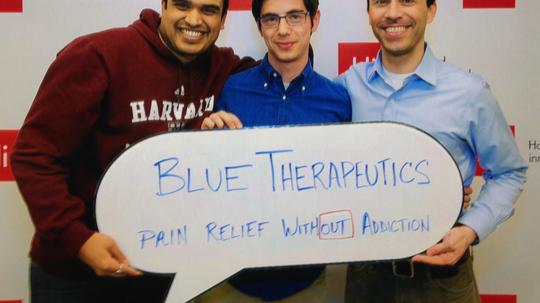
From a very early age, we’re taught the evils of drug addiction. No one ever starts off their lives aspiring to be an addict, and there’s a perception that anyone who is addicted to drugs belongs in the dregs of society.
Yet, more and more people - normal people, like grandparents and college athletes - are becoming addicted to opioids. In 2014, a Public Health Emergency was declared in Massachusetts as overdoses and cases of addiction rose, and the state government has been working to combat our opioid problem since then.
The prevalence of opioid addiction has been attributed to prescription pain medication. According to the founding team at Blue Therapeutics - a venture developing a painkiller that’s stronger than morphine but poses zero risk of abuse - a critical component of the opioid crisis is pain itself.
The root of the matter
It can be easy to point fingers in terms of who’s to blame for the opioid crisis. While the government has been cracking down on doctors to ensure they aren’t overprescribing painkillers, the Blue Therapeutics founders -- Ajay Yekkirala, Michio Painter and David Roberson -- explained that it’s not that simple.
“An important element of the addiction problem we’re facing is the prevalence of pain,” said Roberson. “Pain is the most common reason people seek health care, and the most prescribed medications are painkillers. Pain is a big problem that must be addressed. The opioids that are currently widely used are addictive, but they’re also the most effective compounds to treat pain.”
“The only medications that are truly effective for pain relief do have these side effects and these addictive qualities,” added Painter. “People don’t really have a choice. It’s between relieving pain and potential addiction.”
In a nutshell: Health care providers are using the best medications available to manage their patients’ pain. Unfortunately, the best medications currently on the market happen to have a serious risk of dependence.
Bringing a non-addictive solution to the masses
Yekkirala had helped develop a molecule that would eliminate this medical trade-off while he was a PhD student working in a lab at University of Minnesota. For the past year-and-a-half, he and the rest of the Blue Therapeutics team have run with this concept, working on an alternative painkiller that is even more effective than existing opioids but that present no potential for dependency.
To keep it as layman as can be: Blue Therapeutics’ painkiller will be an agonist for a type of opioid receptor that differs from the kind that traditional opioids use. These new receptors aren’t present in our brains’ “pleasure centers” - unlike the receptors that are currently being targeted with medications like oxycodone. At the same time, Blue Therapeutics’ compound will act as an antagonist to the types of receptors that are found in pleasure centers.
“It’s the health care system providing the best solution they have to treat pain most effectively and, in turn, we’ve been making addicts.”
Basically, it’s taking a two-pronged approach to ensure pain is being relieved, but that no pleasure is being chemically produced in the process. So no dependency will be unintentionally developed from people simply trying to stop their pain.
Over the past year, Blue Therapies has been involved with organizations like the Harvard iLab, MassChallenge and MassBio. Now, the venture is actively fundraising so it can conduct the required FDA studies that would allow the company to run clinical trials.
Addiction could happen to anybody
At the end of my conversation with the Blue Therapeutics team, I couldn’t help but share what compelled me to reach out to them. I, like so many people out there now, have had someone in my life who has developed an opioid addiction, becoming physically dependent on methadone (and perpetually out of it) following a surgery to remove a rare form of cancer.
That instantly resonated with the founders.
“It’s amazing how frequently we run into people personally affected by this,” Roberson began. “It’s the health care system providing the best solution they have to treat pain most effectively and, in turn, we’ve been making addicts.”
“If you’re given a high dose of opiates, no matter the intentions, you’re at a high risk of becoming an addict,” he continued.
If anything, similar stories have only made Blue Therapeutics market research on the easy side. Painter explained, “Almost everyone we talk to has a personal connection to this issue. That’s how we really know this is a pervasive problem.”
“We need to change the perception that people tend to generally have when they think about drug addicts,” Yekkirala said. “There have been documentaries and Times articles that have down a good job of dispelling some of that perception. It could be any of us, quite frankly, who are on this call. We could be addicts.”
Image via Blue Therapeutics.








